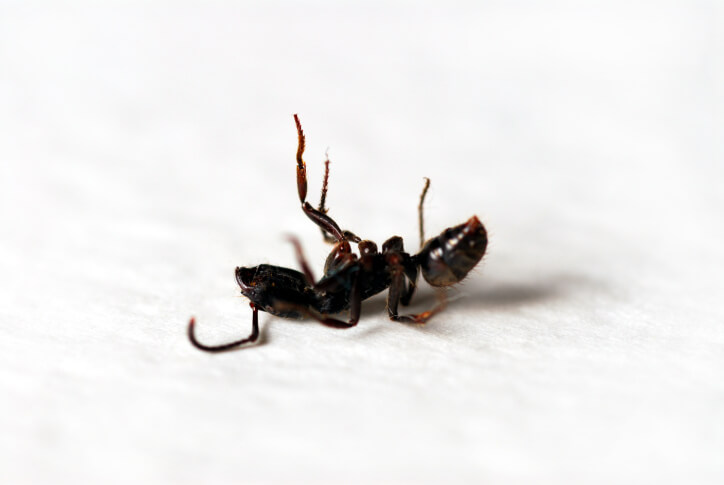
Does Ant Spray Work?
An insecticide ant spray is a common choice for controlling ants, but you may have used them in the past and found they don’t work well. The fact is that ant sprays work very well but only if used properly and in conjunction with other ant control methods. Liquid ant sprays have a very specific purpose in killing ants, but they cannot reach and destroy the ants that remain in the nest. It’s essential to kill all of the ants, especially the egg-laying queen, or your ant problem will return again and again.
Using an ant spray inside your home will kill the scout ants that it touches and may provide some residual protection, but it can never destroy the multitude of ants that never enter your home. Ant spray should be used along with indoor and outdoor ant baits, as well as granules or another outdoor treatment that targets the nest itself. The combination of these three ant killers is almost always effective at totally eradicating an ant infestation.
Ant Spray
Ant sprays are most effective when used outside, around the exterior of the home. Most exterior sprays will continue to kill ants residually for a period of time, but they will still need to be reapplied periodically. The product label should give instructions on how often to apply the spray.
The best ant sprays will kill ants and repel them too. They contain scents, tastes, or other substances that are very unpleasant for ants. When the scout ants encounter the spray, they will be more likely to turn back and search elsewhere for their food.
The spray will need to be applied to the ground in a one foot strip around the entire exterior of the home. It should also be sprayed on the foundation itself, at least 18 inches up from the ground. Windows and doors should be treated as well, with a one foot wide spray around the frame. Any other entrances to the home, such as air conditioner or heat pump ducts, should be sprayed. It’s important to avoid spraying the air intakes of these devices, however, to prevent drawing the insecticide into the air of your home.
An ant spray must be applied diligently to every area that ants may enter. Leaving gaps or missing some entrances will likely make the spraying effort a failure.
Ant Bait
Ant baits are the best way to tackle the ants that come into your home. Baits combine an effective insecticidal ant killer with an attractive sweet food source. Scout ants will find the bait, eat it, and then take some back into the nest to feed to other ants and the queen. The bait contains poison at a level that will not kill the ants immediately but will give them plenty of time to share the bait with the rest of the colony. After a short time, each ant that has eaten the bait will die.
Ant baits will need to be replaced with new ones about every two weeks to keep a continual supply available until the colony is destroyed.
Destroying Ant Nests
Though ants sometimes set up small colonies inside a structure, their “home base” will always be in an underground nest. This is where the queen lives, and the lives of all the other ants depend upon her. The queen provides a sort of “controlling mind” for the rest of the ant colony. By releasing pheromones, she communicates instructions with the workers, nurses, and scout ants. Without the queen, the ant colony cannot survive. This is why it is so essential to attack and destroy the nest directly.
Ant nests are usually visible as mounds of grainy-looking dirt with a hole in the top to allow the ants to exit and enter the nest. They may be located in a yard, along walkways, or under the home if you have a dirt crawlspace. Nests in the yard may be concealed by grass and will require a little searching to locate. Finding ant nests under a home will require a bright flashlight, and someone may need to crawl under the home to inspect the area more closely.
Some insecticides are formulated especially for use in treating ant nests. It’s possible to use a granule or bait approach, though granules will usually destroy the nest more quickly. Baits, on the other hand, pose little to no danger to pets, children, or wildlife that may come near them. If a pet, for example, were to eat insecticidal granules, he could be made severely ill.
Both ant baits and granules attract ants, who eat the poison and share it with others in the colony. Most brands of granules will withstand rainfall and can last for up to three months before needing to be reapplied. Baits often use liquid as a way to draw ants who are searching for water to drink. When the weather is especially rainy, the ants may stop visiting these baits. Baits need to be replaced or refilled about every two weeks to be effective in hot weather.
All types of ant spray, bait, and granules should be used according to the label directions. For safest application, it’s important to read all cautionary statements and to take any recommended precautions.